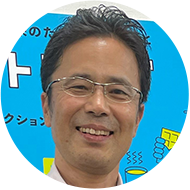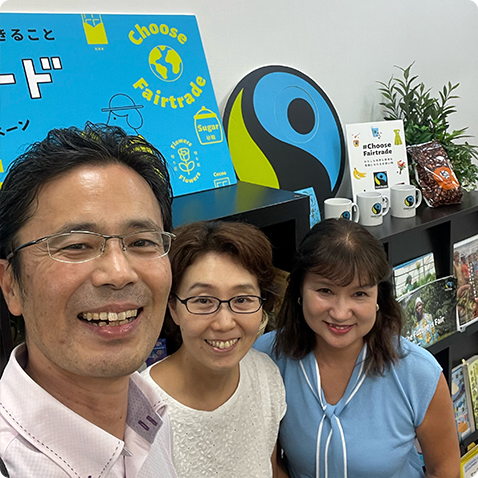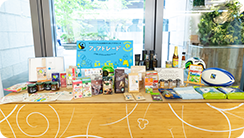Experience of Helping Someone Increases Enthusiasm.
Pro Bono Project that Changed My Attitude, Inspiring Me to Embrace Challenges
Experience of Helping Someone Increases Enthusiasm.
Pro Bono Project that Changed My Attitude, Inspiring Me to Embrace Challenges
Mr. Osamu Fujii, an employee who participated in the Pro Bono project.

Fairtrade Label Japan is an NGO that operates fairtrade systems to help producers in developing countries overcome poverty and improve their lives on their own.
It spreads its ideas through the Fairtrade Label Movement, works to change the mindsets of companies, citizens and public administrations, and conducts activities to establish fairtrade structures in order to protect the global environment and the lives of people in developing countries.
This time, we asked Mr. Fujii about the changes before and after participating in the Pro Bono project that he tried applying for, including how his attitude when starting something new has changed.
Fairtrade Label Japan is an NGO that operates fairtrade systems to help producers in developing countries overcome poverty and improve their lives on their own.
It spreads its ideas through the Fairtrade Label Movement, works to change the mindsets of companies, citizens and public administrations, and conducts activities to establish fairtrade structures in order to protect the global environment and the lives of people in developing countries.
This time, we asked Mr. Fujii about the changes before and after participating in the Pro Bono project that he tried applying for, including how his attitude when starting something new has changed.
Being Helpful First Further Increases Enthusiasm for the Activity.
Being Helpful First Further Increases Enthusiasm for the Activity.
The project I participated in was to support Fairtrade Label Japan, an NGO that conducts activities for fair trade. “Fair trade” is a system to execute trades at fair and right prices in order to resolve problems surrounding the global environment, and producers and children in developing countries.
Up until the participation, I had not been interested in volunteer activities or international support activities. To be honest, the reason I participated in the Pro Bono project was because I just felt like it. On the other hand, some of my team members applied for the participation with high aspirations, so I felt uneasy.
The project I participated in was to support Fairtrade Label Japan, an NGO that conducts activities for fair trade. “Fair trade” is a system to execute trades at fair and right prices in order to resolve problems surrounding the global environment, and producers and children in developing countries.
Up until the participation, I had not been interested in volunteer activities or international support activities. To be honest, the reason I participated in the Pro Bono project was because I just felt like it. On the other hand, some of my team members applied for the participation with high aspirations, so I felt uneasy.

Osamu Fujii
Osamu Fujii
However, the Pro Bono project taught me that having an experience of being helpful for someone can also increase our own interest and enthusiasm. For example, someone I met in the Pro Bono project told me about his experience. He said, “To proceed with a project smoothly, the members working together do not necessarily have to be interested in the activity from the start. It is more important to gather people who have the skills necessary for the activity.” He had been involved in activities related to fair trade since he was a student. He also said, “People’s interest comes later. As a leader, if you can’t make a presentation that excites the interest of the members working together on the project, you can’t possibly spread it to society.” With this attitude, he had been gathering the crew to cooperate with him.
In the project I participated in, the website creation skills I had gained in my past work proved to be more useful than I expected, and there were situations where I was able to utilize my basic business skills, such as preparing materials for interviews and writing e-mails. I myself was not interested in fair trade originally, and it was a new discovery that I can be helpful if I have skills. Since then, I have been inspired to take on challenges that can help someone or lead to my own growth, instead of not doing it if I am not interested.
However, the Pro Bono project taught me that having an experience of being helpful for someone can also increase our own interest and enthusiasm. For example, someone I met in the Pro Bono project told me about his experience. He said, “To proceed with a project smoothly, the members working together do not necessarily have to be interested in the activity from the start. It is more important to gather people who have the skills necessary for the activity.” He had been involved in activities related to fair trade since he was a student. He also said, “People’s interest comes later. As a leader, if you can’t make a presentation that excites the interest of the members working together on the project, you can’t possibly spread it to society.” With this attitude, he had been gathering the crew to cooperate with him.
In the project I participated in, the website creation skills I had gained in my past work proved to be more useful than I expected, and there were situations where I was able to utilize my basic business skills, such as preparing materials for interviews and writing e-mails. I myself was not interested in fair trade originally, and it was a new discovery that I can be helpful if I have skills. Since then, I have been inspired to take on challenges that can help someone or lead to my own growth, instead of not doing it if I am not interested.
The Real Challenges Faced by Those Supported that Are Revealed Through Repeated Dialogue
The Real Challenges Faced by Those Supported that Are Revealed Through Repeated Dialogue
One of the things I struggled with in the Pro Bono project was to figure out the real challenges that should be resolved. The request from the NGO was to create a booklet to promote fair trade, but the purpose of the booklet had to be sorted out because the things we wanted to do and the challenges became clearer through interviews.
In Japan, the existence of fair trade is more recognized than before, but less people buy Fairtrade-labelled products than those overseas. Because of the prices and limited variety, it can be said that there is still a hurdle for the products to be purchased by the general public in large quantities. On the other hand, we hypothesized that adopting fairtrade products for chocolates, coffees and other goods handled in cafeterias, concession stands, coffee rooms and other shops in the buildings of companies would be a relatively low hurdle for companies because they could also express it as an initiative to contribute to the SDGs. So, we first moved on to making a booklet for companies.
However, after further interviews with external organizations and other groups, we found that in order to lead to the introduction of the products, it was more effective to create materials to be used for our client companies’ internal proposal documents, than to create a booklet to introduce the products. In order for companies to decide to introduce fairtrade products, it is necessary not only to understand the information, but also to have empathy. We created materials with specific information including those who are supported by this activity and the difference in the amount consumed for fairtrade products between Japan, and Europe and America. Further deriving from the created materials, we also developed the design of a new system that allows companies to internally and externally announce and promote the fact that they handle fairtrade products in the companies, introduced the details of the system, and created the design comprehensive layout of the website to make an application.
Sometimes we do not know what the organizations supported by Pro Bono projects want until we proactively pose questions to them. I realized that it is important to dig deep into challenges and purposes.
One of the things I struggled with in the Pro Bono project was to figure out the real challenges that should be resolved. The request from the NGO was to create a booklet to promote fair trade, but the purpose of the booklet had to be sorted out because the things we wanted to do and the challenges became clearer through interviews.
In Japan, the existence of fair trade is more recognized than before, but less people buy Fairtrade-labelled products than those overseas. Because of the prices and limited variety, it can be said that there is still a hurdle for the products to be purchased by the general public in large quantities. On the other hand, we hypothesized that adopting fairtrade products for chocolates, coffees and other goods handled in cafeterias, concession stands, coffee rooms and other shops in the buildings of companies would be a relatively low hurdle for companies because they could also express it as an initiative to contribute to the SDGs. So, we first moved on to making a booklet for companies.
However, after further interviews with external organizations and other groups, we found that in order to lead to the introduction of the products, it was more effective to create materials to be used for our client companies’ internal proposal documents, than to create a booklet to introduce the products. In order for companies to decide to introduce fairtrade products, it is necessary not only to understand the information, but also to have empathy. We created materials with specific information including those who are supported by this activity and the difference in the amount consumed for fairtrade products between Japan, and Europe and America. Further deriving from the created materials, we also developed the design of a new system that allows companies to internally and externally announce and promote the fact that they handle fairtrade products in the companies, introduced the details of the system, and created the design comprehensive layout of the website to make an application.
Sometimes we do not know what the organizations supported by Pro Bono projects want until we proactively pose questions to them. I realized that it is important to dig deep into challenges and purposes.
It Is Not About the World in a TV Drama. Meeting People who Earnestly Work to Support Developing Countries
It Is Not About the World in a TV Drama. Meeting People who Earnestly Work to Support Developing Countries
I was far from volunteer activities, and I had only seen people working in the field of international support in TV dramas. I realized that there are people who are actually carrying out international support activities in society. It is a great asset for me to have met people I cannot usually get involved with through the Pro Bono project.
In particular, it was really impressive to meet Mr. Shiozaki, the Secretary-General of Fairtrade Label Japan, and Mr. Nakajima, the former Secretary-General.
Both of them were engaged in overseas volunteer activities even before they started fairtrade activities, and they were like the main characters of TV dramas.
Of course, all of the other people who cooperated in interviews and other activities and the members who worked in the Pro Bono project together were also wonderful.
I was far from volunteer activities, and I had only seen people working in the field of international support in TV dramas. I realized that there are people who are actually carrying out international support activities in society. It is a great asset for me to have met people I cannot usually get involved with through the Pro Bono project.
In particular, it was really impressive to meet Mr. Shiozaki, the Secretary-General of Fairtrade Label Japan, and Mr. Nakajima, the former Secretary-General.
Both of them were engaged in overseas volunteer activities even before they started fairtrade activities, and they were like the main characters of TV dramas.
Of course, all of the other people who cooperated in interviews and other activities and the members who worked in the Pro Bono project together were also wonderful.

Commemorative photo with Fairtrade Label Japan staff
Commemorative photo with Fairtrade Label Japan staff
A Pro Bono Project Is a Place Where We Can Try Our Skills as They Are.
A Pro Bono Project Is a Place Where We Can Try Our Skills as They Are.
In company work, we can work while utilizing the know-how accumulated in the company and the relationships that already exist. In a Pro Bono project, on the other hand, we work with people we meet for the first time, in a field where we have never worked before. I felt that a Pro Bono project is also a place where we can try our skills as they are because it has an environment full of “first times.”
Before participating in the Pro Bono project, I was not confident enough to clearly state the skills I had, and I was not sure if I could meet the expectations of the organizations to be supported. However, I was able to contribute more than I thought with the website creation skills I had gained in the past, which gave me confidence. In addition, I started taking courses to relearn the knowledge of website creation from the basics so that I can become more active also in places where I do not have a business title. Through the Pro Bono project, I was able to take inventory of what I can and cannot do.
What we do as a matter of course can help someone unexpectedly. If you are on the fence about participating in a Pro Bono project, whether you are interested in the subject or not, I encourage you to give it a try as a place to try your skills.
In company work, we can work while utilizing the know-how accumulated in the company and the relationships that already exist. In a Pro Bono project, on the other hand, we work with people we meet for the first time, in a field where we have never worked before. I felt that a Pro Bono project is also a place where we can try our skills as they are because it has an environment full of “first times.”
Before participating in the Pro Bono project, I was not confident enough to clearly state the skills I had, and I was not sure if I could meet the expectations of the organizations to be supported. However, I was able to contribute more than I thought with the website creation skills I had gained in the past, which gave me confidence. In addition, I started taking courses to relearn the knowledge of website creation from the basics so that I can become more active also in places where I do not have a business title. Through the Pro Bono project, I was able to take inventory of what I can and cannot do.
What we do as a matter of course can help someone unexpectedly. If you are on the fence about participating in a Pro Bono project, whether you are interested in the subject or not, I encourage you to give it a try as a place to try your skills.
Mr. Fujii applied for the Pro Bono project for no particular reason, and the experience even changed his attitude to try new things. Once you have taken the first step, you will find unexpected discoveries and encounters. In order to expand your view and range of activities, it may be important to start with something that has moved your heart even just a little bit.
Mr. Fujii applied for the Pro Bono project for no particular reason, and the experience even changed his attitude to try new things. Once you have taken the first step, you will find unexpected discoveries and encounters. In order to expand your view and range of activities, it may be important to start with something that has moved your heart even just a little bit.
Pro Bono project in which Mr. Fujii participated:
Pro Bono project in which Mr. Fujii participated:

Eight employees gave support on the proposal document and system design to encourage the consumption of fairtrade products in companies, to Fairtrade Label Japan, which has been working to change the mindsets of companies, citizens and public administrations through the Fairtrade Label Movement, spread the idea of fair trade, and establish more fairtrade structures in order to help producers in developing countries overcome poverty and improve their lives on their own.
Eight employees gave support on the proposal document and system design to encourage the consumption of fairtrade products in companies, to Fairtrade Label Japan, which has been working to change the mindsets of companies, citizens and public administrations through the Fairtrade Label Movement, spread the idea of fair trade, and establish more fairtrade structures in order to help producers in developing countries overcome poverty and improve their lives on their own.


